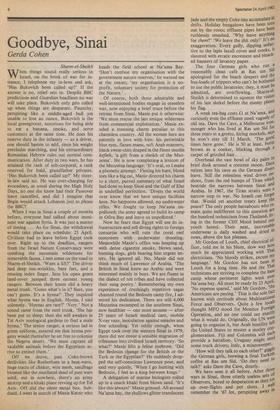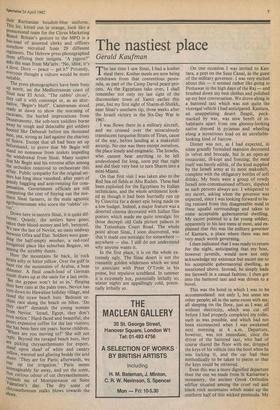Goodbye, Sinai
Gerda Cohen
Shaun-et-Sheikh
When things sound really serious in Israel, on the brink of war for in- stance, I telephone my in-laws and ask, `Has Bukovich been called up?' If the answer is no, relief sets in. Despife BBC predictions and Guardian headlines no war will take place. Bukovich only gets called up when things are desperate. Paunchy, perspiring like a middle-aged bull yet unable to lose an ounce, Bukovich is the local greengrocer, notorious for being able to eat a banana, smoke, and serve customers at the same time. He does his reserve duty in the infantry — as a driver, one should hasten to add, since his weight precludes marching, and his extraordinary Romanian Hebrew rules out normal com- munication. After duty in two wars, he has attained the rank of sub-corporal, a rank reserved for bald, grandfather privates. `Has Bukovich been called up?' My sister- in-law said no. He was over-charging for avocadoes, as usual during the High Holy Days, no one she knew had their Passover leave cancelled, and did I imagine that Begin would attack Lebanon just to please the BBC?
When I was in Sinai a couple of months before, everyone had talked about immi- nent war against Syria. It was just a matter of timing ... As for Sinai, the withdrawal would take place on schedule: 25 April. Civilians had to leave before Egypt took over. Right up to the deadline, rangers from the Israel Nature Conservancy were combing the mountain wilderness for removable fauna. I met some on the road to Sharm-el-Sheikh. 'Want a lift?' The driver had deep sun-wrinkles, bare feet, and a missing index finger. Into his open green land-rover jumped three earnest young rangers. Between their knees slid a heavy metal trunk. 'Guess what's in it? Sure, you can't guess. It's a hyena!' They inquired what hyena was in English. Hyena, I said solemnly. 'Hyenas are rare?' Very.' Not a sound came from the steel trunk. 'She has been put to sleep; then she will awaken in Tel Aviv zoological gardens to find a male hyena.' The senior ranger, a serious lad in green uniform, assured me that hyena pro- geny would thereafter be set free to colonise the Negeve desert. 'We must capture all vaulable animals before the Egyptians ar- rive to extinct them.'
Off we drove, past Coke-brown declivities like Rotherham in a heat-wave, huge tracts of clinker, wire mesh, sandbags bloated like the mutilated dead of past wars until, out in nowhere, there's an army airstrip and a khaki plane revving up for Tel Aviv. Off slid the silent metal box. Sub- dued, I went in search of Maxie Katzir who heads the field school at Na'ama Bay. `Don't confuse my organisation with the government nature reserves,' he warned me at the outset; 'my organisation is a no- profit, voluntary society for protection of the Nature.' ,
Of course, both these admirable and well-intentioned bodies engage in ceaseless war, now enjoying a brief truce before the retreat from Sinai. Maxie put it otherwise: `We must rescue the last unique wilderness from commercial exploitation.' Maxie ex- uded a stunning charm peculiar to this charmless country. All the women here are patently in love with him: his periwinkle blue eyes, flaxen mane, soft Arab manners, black sweat-shirt draped in the finest muslin kefieh, 'a gift from a sheikh of the Muz- zeina'. He is now completing a lexicon of the Muzzeina language: 'It's oral, so I make a phonetic attempt.' Flexing his bare, blond toes like a big cat, Maxie directed his charm to a short, purred summary of what Israel had done to keep Sinai and the Gulf of Elat in undefiled perfection. 'Divers the world over know that we have unique facilities here. No harpoons allowed, no underwater rifles. We fought to keep Na'ama un- polluted; the army agreed to build its camp in Ofira Bay and leave us unpolluted.'
Now he fears that Egypt will use its in- frastructure and sell diving rights to foreign consortia who will ruin the coral reef ecosystem with underwater shooting. Meanwhile Maxie's office was heaping up with dense cigarette smoke, blown sand, hunting dogs, girls bearing him urgent let- ters. He ignored all. No, Maxie did not think much of Lawrence of Arabia. 'The British in Sinai knew no Arabic and were interested mainly in boys. We are fluent in the dialect of ten tribes and have collected their sung poetry.' Remembering my own experience of crushingly repetitive sagas chanted round the Bedouin camp fire, I ad- mired his dedication. There are still 4,000 Muzzeina encamped in the southern Sinai, now healthier — one must assume — after 25 years of Israeli medical care, mobile X-ray vans, inoculation against measles and free schooling. Yet oddly enough, when Egypt took over the western Sinai in 1979, there did not ensue a sensible migration of tribesmen into civilised Israeli territory. 'So what?' Maxie lifts a feline eyebrow. 'Did the Bedouin cbange for the British or the Turk or the Egyptian?' He suddenly drop- ped the self-conscious Lawrence pose, and said very quietly, 'When I go hunting with Bedouin, I feel as a king between kings.'
A delegation of marine biologists rolled up in a coach khaki from blown sand. 'It's like this always!' Maxie grinned. All around Na'ama bay, the shallows glitter translucent
Spectator 24 April 1982 jade and the empty Coke tins accumulate in drifts. Holiday bungalows have been torn out by the roots; effluent pipes have been ruthlessly smashed. 'Why leave anything for them?' We leave the shit only!' It's no exaggeration. Every gully, dipping seduc-
tive i
ve to the lapis lazuli coves and creeks, s slavered with erratic excrement and bleach- ed banners of lavatory paper. The four German girls who run a reasonably clean cafe at Ras urn Sid apologised for the beach sleepers and the bus-loads of trippers who can't be bothered to use the public lavatories: they, it must be admitted, are overflowing. Sharni-el" Sheikh is determined to squeeze the visitor of his last shekel before the enemy plants his flag. A weak tea-bag costs £1 at Na'ama, and curiously even the effluent smelt vaguely of old tea. Dave the Cave, a Melbourne iron- monger who has lived at Ras urn Sid for three years in a grotto, hiring snorkels, says he won't stay till 31 March. Sinai and Arabia. In 1967, the Tiran straits we e a narrow step to war. No Israeli can forget that. Would yet another treaty keep the peace? The only people hereabouts who re- main quite indifferent to this question are the hundred technicians from Thailand, liv- ing in the former Cliff Motel behind ow youth hostel. Their neat, inscrutable i underwear is daily washed and dried n rows, above the hot plateau. Mr Gordon of Louth, chief electrical of- ficer, told me in his blunt, slow way how. much he appreciated working with Thai . electricians. `No bloody strikes, excuse InY language.' Mr Gordon has not been In Louth for a long time. He and the Thal technicans are striving to complete the base camp whose perimeter lights wink over Na'ama bay. All must be ready by 25 April. `No expense spared,' said Mr Gordon, 'the Americans are paying.' That is the sole fact known with certitude about Multinational Force and Observers. Quite a few locals thought MFO stood for Monitor Foreign Operation, and no one could say exactly what it would do. Originally, the UN wer,e, going to organise it, but Arab hostility let` the United States to muster a motley con- glomeration. Fiji and Colombia will each provide a battalion. Uruguay might send some truck drivers; Italy, a minesweeper. `How will they talk to each other?' giggle the German girls, brewing a final Turkish coffee at Ras um Sid. `Do they need to talk?' asks Dave the Cave, dourly. We have seen it all before. After three wars in Sinai, three utterly useless sets of Observers, bored to desperation as they tot i up over-flights and pot shots. I We' remember the '67 lot, perspiring away in their Ruritanian boudoir-blue uniform. This lot, kitted out in orange, look like a promotional team for the Citrus Marketing Board. Britain's gesture to the MFO is a bus-load of assorted clerks and officers somehow recruited from 29 different regiments. The Hebrew press photographed them affixing their insignia. 'A pigeon?' asks the man from Ma'ariv. 'No, idiot, it's a dove. Dove — peace — get it?' Privately, everyone thought a vulture would be more suitable.
The press photographers have been busy up north, on the Mediterranean coast of Sinai near El Arish. 'The rabbis' circus', they call it with contempt or, as an alter- native, 'Begin's bluff'. Cameramen stood ready at dawn to show the storming of caravans, the hurled imprecations from Deuteronomy, the sob-torn toddlers borne away by tough and delectable girl soldiers booted like Deborah before ten thousand Men, yea, strong as Jael against the chariots of Sisera. Except that all had been set up beforehand, to prove that Mr Begin will stand no nonsense from zealots impeding the withdrawal from Sinai. Many suspect that Mr Begin and his extreme allies among the orthodox connived to orchestrate this affair. Public sympathy for the original set- tlers has long since vanished, after years of greedy haggling and arm-twisting for com- pensation. Government officials are still computing the cost of buying out the nor- thern Sinai farmers, in the main agnostic agribusinessmen who scorn the 'rabbis' cir- cus'.
Down here in eastern Sinai, it is quite dif- ferent. ferent. Quietly, the settlers have gone; Laken their blood-money and left, betrayed. we saw the last of Neviot, an oasis midway between Ofira and Flat. Soldiers were guar- ding the half-empty moshav, a red-roof nongaloid place like suburban Bognor, set among the scrubby dunes. Here the mountains lie back, in rock strata ashy or bitter yellow. Over the gulf in haze rise the mountains of Arabia, a heat shimmer. A final coach-load of German Youth draws up at the oasis for a last swim. et the gyppos won't let us in,' flinging their beer cans at the palm trees. Neviot has torn down its Hawaiian holiday village, and red the straw beach huts. Bedouin ur- chins race along the beach on bikes. 'Do they care?' demands the young woman from Neviot. 'Israel, Egypt, they don't even notice.' Hard-faced and beautiful, she pours expensive coffee for the last visitors; i_ has been here ten years, borne children. Where are you moving to?' She will not reply. Beyond the ravaged beach huts, they are Picking chrysanthemums for export, sheaf upon sheaf of white and canary Yellow, watered and glinting beside the arid ,shore. 'They are for Paris; afterwards, we tear 111) the irrigation.' Paris seems unimaginably far away, and yet the scent, that curious odour of cut chrysanthemum, reminds me of Montparnasse on Saint valentine's day. The dry scent of chrysanthemum stalks blows towards the shore.







































 Previous page
Previous page